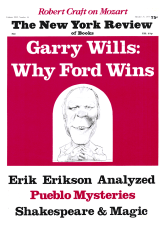In response to:
Within the Pale from the May 15, 1975 issue
To the Editors:
A straight question deserves a straight answer. Karl Miller asks why Seamus Heaney’s “Limbo” is not in the Faber (shortly to be MacMillan) Book of Irish Verse, previewed by him in your columns on May 15. The obvious answer is that I, as editor of the anthology, do not like the poem which I find sentimental and theologically anachronistic. There is a much stronger and braver poem on an analogous subject by Thomas Kinsella a few pages earlier (“Ballydavid Pier”). There are other poems of Seamus which I prefer, including the first poem in his new book, “Mossbawn Sunlight,” which I was delighted to include as Karl Miller obviously would be glad to include “Limbo,” if he were the editor.
In an astonishing lapse of rhetoric Mr. Miller claims that “Ulster’s troubles have given rise to war songs, to the praise of dead heroes” and asks why they are not included. The only poem that suits that bill, thank God, is Kinsella’s “Butcher’s Dozen” which again does not seem to me his best effort; Irish, and especially Ulster, poets have been more saddened than thrilled by the slow bursting of the abscess of Ulster. “The poetry of reflection” he speaks of is more common: I have myself committed an eighty-page poem on the subject (The Rough Field) but it would have been a little invidious of me to include it in this anthology! But I have included poems by MacNeice, Longley, Derek Mahon (his “Ecclesiastes” seems to me the most honest statement by any of the younger Ulster poets) as well as Heaney’s “Tollund Man,” all of which reflect our local tragedy. But in general the new Ulster poets have preferred to deal with the subject obliquely, until very recently.
John Montague
University College, Cork
Ireland
Karl Miller replies:
It is good of Mr. Montague to give his “straight answer.” I haven’t the text of the review at hand, but I remember wondering about the poetry which has dealt with the current struggle in Northern Ireland, and mentioning that there were these war songs: but I did not claim that the latter should have been represented in his anthology. The article will not be found to be enthusiastic about dead heroes.
This Issue
October 16, 1975



